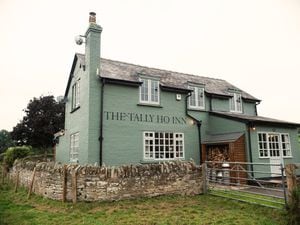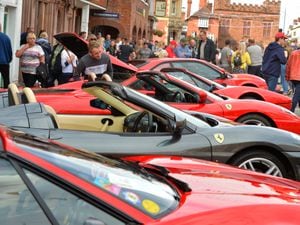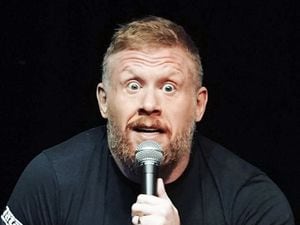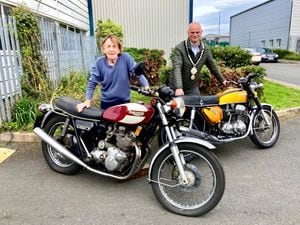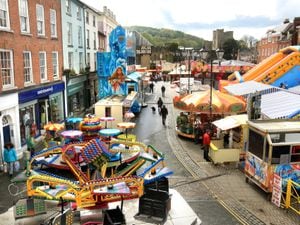Norman Wanstall: I swapped the Hollywood dream for job as a plumber
It's not every day you walk into someone's front room to find an Oscar glimmering proudly on the mantelpiece. But then, Norman Wanstall isn't your everyday kind of guy.
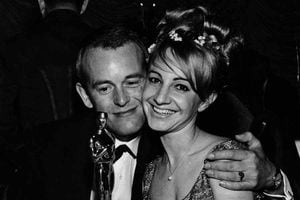
At the height of his movie-making prowess, he rubbed shoulders with Hollywood's greatest stars and technicians . . . only to turn his back on a glittering career in the cinema industry for a taste of the Good Life, retreating deep into the West Midlands countryside.
His new band of A-list cast members became a menagerie of chickens and goats, he decided to retrain as a plumber, and he doesn't regret the decision for a single moment.
"I don't normally keep the Oscar there," says the delightfully disarming Norman, pointing to the sideboard. "I just got it out because I knew you were coming, and thought you'd like to see it.
"Go ahead, pick it up," he gestures, so I do. It's much, much heavier than expected. A movie heavyweight indeed. So where does he normally keep it, then?
"It's usually upstairs, wrapped up safely in an old briefcase in one of the cupboards," he reveals. "All of the stuff connected to my film career is in there, because I take it out to give talks or presentations."
Norman's Oscar is looking mighty fine for its age. He won it for his ground-breaking sound effects on classic James Bond film Goldfinger, which will be 50 years old next year. Until the success of the latest 007 film, Skyfall, he was the only man ever to win an Oscar for sound work on the long-running spy franchise.
"The trip to Hollywood was surreal, really," Norman recalls. "Back in those days, the ceremony wasn't anywhere near as high profile as it is today.
"I remember that I was working on Michael Caine spy movie The Ipcress File when a telegram came through from America. They wanted to know who was responsible for the sound effects on Goldfinger. I thought it was for some sort of database, but the next thing I knew, a few weeks later, I got an invitation to the awards.
"Working in the industry you don't tend to get star-struck very often, but when you see a complete who's who from Hollywood all in the same place at the same time, listening to what you have to say on stage, it is pretty overwhelming."
As a schoolboy, Norman's first taste of the film industry came on a visit to Pinewood Studios, which left a lasting impression.
He recalls: "It was 1949 and I was 14. A friend's mother was assistant to the production controller, and she invited a group of us to visit in the school holidays.
"I was absolutely captivated by what I saw. The highlight was being allowed onto one of the stages and watching Alan Ladd rehearsing a scene for Hell Below Zero.
"I thought to myself this is magic, fairyland. I want a part of all this!"
After leaving school, Norman spent two years doing his National Service. But he never forgot that day at Pinewood, and wasted no time contacting that production controller, Lana Stevens, again.
"Fortunately she remembered me, and invited me to the studio for a chat. To cut a long story short, she offered me a job as a trainee film editor. I was on my way."
According to Norman, what happened next was in large part down to luck – right place, with the right people, at the right time. But that's clearly playing down his abilities, as he became one of the most in-demand sound editors of his era.
Early projects included Jumping For Joy starring Frankie Howerd and Ill Met By Moonlight with Dirk Bogarde, and his friendship with one of the leading British film editors of the time, Peter Hunt, brought him into the 007 team.
On the first film, Doctor No in 1962, the cash-strapped producers couldn't afford the two dubbing editors required for dialogue and sound-effects so Norman was promoted to sound effects editor. "No-one had any idea how successful the films would go on to be, but it was clear when we started looking at the footage that Sean Connery was special, and was going to make this a hit."
Norman worked on the next four Bond films, and collaborated with Hollywood greats such as Sidney Poitier on Warm December, Stanley Kubrick on Barry Lyndon, and the legendary Francois Truffaut on Fahrenheit 451.
He's responsible for some of the most iconic sounds in those early Bond films. Dr No's whirring nuclear machine and electronic lift, for example, plus the whoosh of Oddjob's steel-rimmed hat as it travelled through the air in Goldfinger, and the baddie's iconic laser beam.
These days, creating these sounds is just a case of computer trickery, or fishing a ready-made sound out of an archive. But in the early 1960s, this technology simply didn't exist. Norman would walk around with a sound recorder, picking up everything from the twang of a carpenter's saw to a roadworker's generator on the street outside. Sometimes, it would be a case of running after an interesting sound to find out what it was, microphone at the ready, or rummaging around in a toy shop.
Crushed
"My favourite overall sound sequence is the scene when a car gets crushed, which I created for Goldfinger. Several different tracks were mixed together, and I love all the crunching metal and breaking glass. I had a terrible job finding a sound for the heaving jaws of the machine, and it was only by chance that some workmen came to do a job on the studio car park with a big compressor.
"I thought, that sound is perfect for my needs, so I rushed out and recorded it on a toy recorder – the only machine my sound recordist could loan me at the time.
"People who work in the computer-driven movies these days would find all that hard to imagine, but the early Bonds were challenging because the stories were moving into futuristic territory at times and the sound technology available had to catch up. I was faced with the task of creating totally original sounds, and a lot of the time I didn't really have the tools for the job so I had to scout around for ideas." So here's the million dollar question. After reaching the very pinnacle of the industry, mixing it with so many legends and having such creative fun, what persuaded Norman Wanstall to jack it all in, and start a new life?
"It was the pace of it all really, and the lack of security the business offers," he says. "I was 40 years old, racing around London on the motorbike I had at the time, and working crazy, unpredictable hours. I started to think that, if I stuck with this for the next 25 years, I was never going to know where the next job would be coming from.
"I'd got a wife and daughter by this time, and it just felt the right time to start another chapter of my life."
So that's exactly what Norman did. Quit the film industry almost overnight, and put his family home at Englefield Green in west London on the market. Initially, he started looking for a rural bolt-hole in Devon and Cornwall, but a friend suggested he check out the West Midlands where property prices were much lower, but the quality of countryside life was every bit as high.
"They had a weekend cottage in the tiny Shropshire village of Priest Weston and told us that if we wanted to live in 'real countryside', we should try the area. So we came up for a weekend to have a look round, and loved it." Norman stumbled upon an old rectory with seven acres of land in the countryside hamlet of Wolferlow, not far from Tenbury Wells. It was just what he had been looking for, and in 1977, he bought it.
"It did need quite a lot of work doing to it, but I've always been good with my hands." Ah yes, Norman's hands. He also retrained as a plumber, signing up for a 32-week City & Guilds course in Birmingham which set him on his way to a healthy self-employed career.
Only once was he enticed back into the movie business, and that was to work on Never Say Never Again, the 1983 rebirth of Sean Connery as James Bond.
"I think they wanted Sean to have a familiar face on the team from the old Bond days, so I said I'd do it. But it was a shambles, a disaster," he remembers. "It confirmed my view that I had been right to get out of the business."
Apart from his Oscar, what are Norman's other career highlights? "Well, the film I worked on that I call my favourite was without doubt The Ipcress File. But my most memorable film has to be the first one I got the chance to edit, which was called Joanna. It was while working on the Bonds that I was contacted by a popular singer, actor and writer called Mike Sarne, who had shot a short film called Road to St Tropez but hadn't been able to afford a sound crew. I liked the guy so much I put a track on the film for him free, and we became close friends.
"Some time later he was given the chance by 20th Century Fox to direct his own script, Joanna, and he rewarded me by giving me the chance to edit it.
"The critics picked up on it and other directors became interested - even the great Norman Jewison short-listed me for Fiddler On The Roof."
These days, 77-year-old Norman is living a happy retirement in the village of Burford, on the Shropshire-Worcestershire border. He's just back from a trip to Australia, visiting his daughter.
Although the latest 007 film, Skyfall, followed in his footsteps by winning an Oscar for its sound, he's non-plussed by its critical acclaim. "It is technically superb in every way, but way over the top stunt-wise, and very slow in places."
Lacking that licence to thrill, you might say. Unlike the amazing life story of Norman Wanstall, a charming, unassuming golden man with the Midas touch.
Read more real life stories in your Weekend Shropshire Star, every Saturday.

